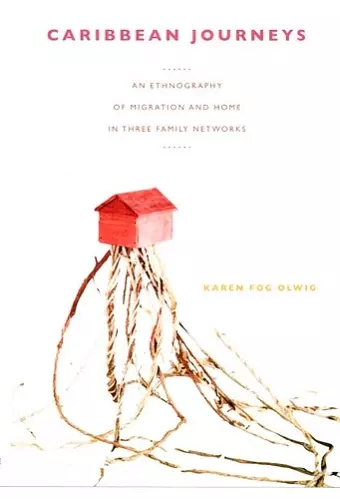Caribbean Journeys
An Ethnography of Migration and Home in Three Family Networks
Format:Hardback
Publisher:Duke University Press
Published:12th Jun '07
Currently unavailable, and unfortunately no date known when it will be back

An ethnographic study of migration based on the experiences of three dispersed Caribbean families as they maintain networks across their diverse locations
An ethnographic analysis of the cultural meanings of migration and home in three families of West Indian origin whose members are dispersed throughout the Caribbean, North America and Great Britain.Caribbean Journeys is an ethnographic analysis of the cultural meaning of migration and home in three families of West Indian background that are now dispersed throughout the Caribbean, North America, and Great Britain. Moving migration studies beyond its current focus on sending and receiving societies, Karen Fog Olwig makes migratory family networks the locus of her analysis. For the people whose lives she traces, being “Caribbean” is not necessarily rooted in ongoing visits to their countries of origin, or in ethnic communities in the receiving countries, but rather in family narratives and the maintenance of family networks across vast geographical expanses.
The migratory journeys of the families in this study began more than sixty years ago, when individuals in the three families left home in a British colonial town in Jamaica, a French Creole rural community in Dominica, and an African-Caribbean village of small farmers on Nevis. Olwig follows the three family networks forward in time, interviewing family members living under highly varied social and economic circumstances in locations ranging from California to Barbados, Nova Scotia to Florida, and New Jersey to England. Through her conversations with several generations of these far-flung families, she gives insight into each family’s educational, occupational, and socioeconomic trajectories. Olwig contends that terms such as “Caribbean diaspora” wrongly assume a culturally homogeneous homeland. As she demonstrates in Caribbean Journeys, anthropologists who want a nuanced understanding of how migrants and their descendants perceive their origins and identities must focus on interpersonal relations and intimate spheres as well as on collectivities and public expressions of belonging.
“Building on her previous work on historical consciousness, nationalism, and transnationalism, Karen Fog Olwig outlines a new direction for migration studies. By highlighting the ways that individuals’ personal understandings of their migratory experiences are connected to foundational family narratives, Olwig broadens understanding of belonging and diaspora.”—Deborah A. Thomas, author of Modern Blackness: Nationalism, Globalization, and the Politics of Culture in Jamaica
“In this nuanced, sensitive tracing of kinship across borders, Karen Fog Olwig reminds us that most often family ties are at the heart of why migration processes are transnational. An outstanding contribution to kinship, migration, and transnational studies, Caribbean Journeys is an excellent counterpoint to glib references to transnational or diasporic communities.”—Nina Glick Schiller, coauthor of Georges Woke Up Laughing: Long-Distance Nationalism and the Search for Home
“Caribbean Journeys is a refreshing look at immigration from an unusual point of view, and it is worth reading and using in courses not only on immigration but also on social networks, family studies, and cultural identity development.” -- Silvia Domínguez * American Journal of Sociology *
“Karen Fog Olwig presents a profound ethnographic study of three transnational Caribbean families. . . . As she describes the nuanced and colourful lives of her participants, it becomes evident that Olwig’s study transcends the fundamental migration related experience. . . . Caribbean Journeys is a valuable contribution to migration literature.” -- Terry-Ann Jones * Ethnic and Racial Studies *
“This study of three families’ respective histories of migration from the Caribbean holds many points of interest both for Caribbeanists and for those concerned more generally with migration studies. There is also something here for students of identity politics, both in the UK and in the USA. . . . [An] ethnography of extremely dense and rich transnational relations.” -- Diane Austin-Broos * Journal of the Royal Anthropological Institute *
ISBN: 9780822339779
Dimensions: unknown
Weight: 585g
336 pages